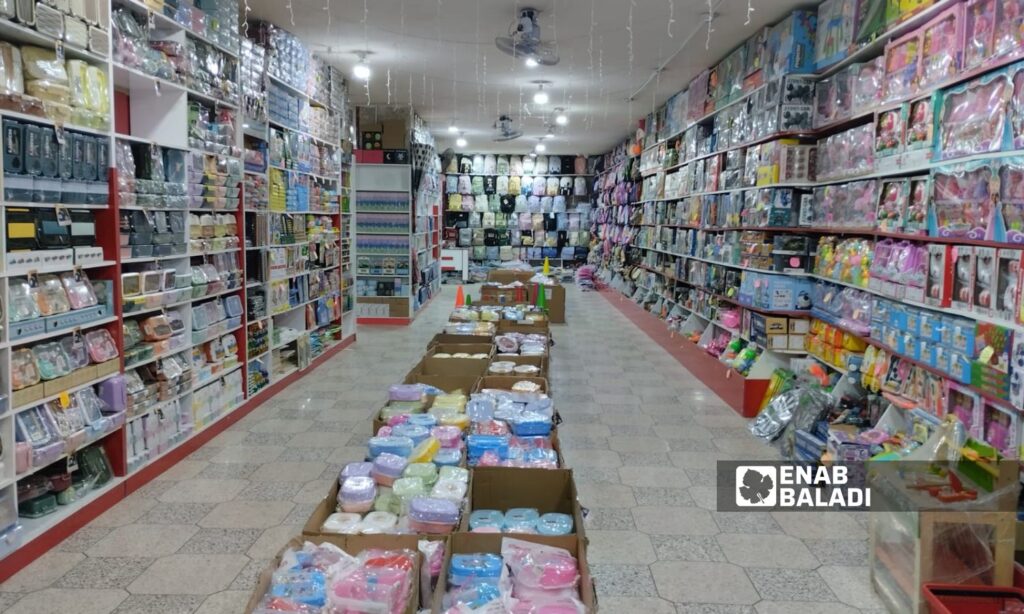Idlib – Samah Alloush
With the beginning of the new school year in Idlib city on September 28, families have begun the search for stationery and supplies for their students at prices that match their financial situation.
Shops and bookstores post ads for sales and discounts on stationery, school bags, and other supplies, which have increased following the opening of the third edition of Idlib Markets on September 20.
Despite the deals, most parents find the prices high, as the daily wage for a worker does not exceed 100 Turkish liras (three US dollars) at best, amidst an endless list of needs.
A nightmare for parents
The beginning of the school year is a nightmare for parents in Idlib, according to Mrs. Heba, a mother of three girls in school. She attributes this to limited financial resources and the inability to buy all the necessary bags and supplies.
Mrs. Heba turned to the Idlib Markets event because of the discounts and sales. She bought a 100-page notebook for ten Turkish liras, whereas its regular price outside the market is 20 Turkish liras.
She tried to avoid letting her daughters see some school supplies so they wouldn’t ask her to buy them. She considers many of these items as luxuries and new trends among students, like lunch boxes and water bottles that come in attractive shapes and colors.
A stationery seller in the market told Enab Baladi that bookstore owners offer large quantities and lower their profit margins to sell as many items as possible.
He added that they attract parents to buy all the necessary supplies, achieving their advertising goals for their companies and shops. As soon as they put up a sign in the shop window reading “Sales and Discounts,” customers rush in to look and buy what they need.
Second-hand items for low-income families
Walaa, a resident of Idlib, resorted to buying second-hand bags for her children. A new medium-sized bag of average quality costs between 200 and 250 Turkish liras, while she bought a similar used bag for 75 Turkish liras.
Second-hand supplies are popular among parents, especially those with limited incomes and those with more than one child in school.
According to Enab Baladi‘s correspondent in Idlib, shops selling second-hand supplies, whether clothes or stationery, are widespread, and almost every neighborhood in Idlib has one.
For example, used children’s pants sell for between 30 and 75 Turkish liras, while new ones range between 200 and 400 Turkish liras.
There are popular markets (bazaars) throughout the week, distributed daily in a specific neighborhood, offering both used and new items. They include stalls with European products for toys and stationery, such as pens, coloring boxes, pencil cases, and bags.
20% increase since 2023
The depreciation of the Turkish lira against the US dollar has led to price hikes for various types of goods, with one dollar equal to 33 Turkish liras, the currency in northern Syria.
The owner of a wholesale bookstore told Enab Baladi that stationery prices have increased by 20% compared to 2023. He noted that prices vary depending on the quality of the goods.
For example, there is a pencil worth two Turkish liras and another worth 50 liras. He added that there are no fixed prices, as the matter is subject to supply and demand.
He described the buying activity as “weak,” attributing it to the fact that most parents buy the supplies after school starts to get what is required by their children and avoid purchasing unnecessary items.
Many only come to ask about prices to prepare for what to expect.
A fragile education sector
The education sector in northwestern Syria is experiencing instability and suffering, encompassing staff and infrastructure. Public schools are facing continuous crises, a shortage of supplies, reduced support, and a lack of diesel for heating, school books, and teachers’ salaries.
International and local figures reflect the fragility of the education sector and its need for support, with 2.2 million school-age children living in northwestern Syria, one million of whom are out of school.
On September 9, the Syria Civil Defence counted 170 schools targeted by the regime and Russia over the past five years, noting that schools have been targets for the regime and Russia for years.
The decline in support in northern Syria during 2024 has affected 700 schools in Idlib lacking basic support, with 100 schools losing support by last July, impacting 110,000 students and 6,500 teachers, according to the United Nations Office for the Coordination of Humanitarian Affairs (OCHA).

